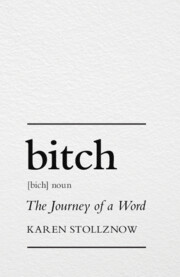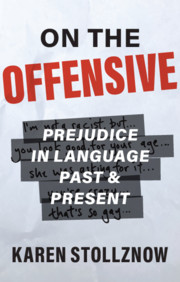19 results

Bitch
- The Journey of a Word
- Coming soon
-
- Expected online publication date:
- June 2024
- Print publication:
- 27 June 2024
-
- Book
- Export citation
Notes
-
- Book:
- On the Offensive
- Published online:
- 06 October 2020
- Print publication:
- 15 October 2020, pp 255-306
-
- Chapter
- Export citation
Acknowledgments
-
- Book:
- On the Offensive
- Published online:
- 06 October 2020
- Print publication:
- 15 October 2020, pp viii-viii
-
- Chapter
- Export citation
Conclusion
-
- Book:
- On the Offensive
- Published online:
- 06 October 2020
- Print publication:
- 15 October 2020, pp 251-254
-
- Chapter
- Export citation
Index
-
- Book:
- On the Offensive
- Published online:
- 06 October 2020
- Print publication:
- 15 October 2020, pp 307-316
-
- Chapter
- Export citation
Dedication
-
- Book:
- On the Offensive
- Published online:
- 06 October 2020
- Print publication:
- 15 October 2020, pp v-vi
-
- Chapter
- Export citation
7 - God’s Waiting Room
-
- Book:
- On the Offensive
- Published online:
- 06 October 2020
- Print publication:
- 15 October 2020, pp 222-250
-
- Chapter
- Export citation
3 - Not That There’s Anything Wrong with That
-
- Book:
- On the Offensive
- Published online:
- 06 October 2020
- Print publication:
- 15 October 2020, pp 96-123
-
- Chapter
- Export citation
6 - Hit by the Ugly Stick
-
- Book:
- On the Offensive
- Published online:
- 06 October 2020
- Print publication:
- 15 October 2020, pp 196-221
-
- Chapter
- Export citation
Contents
-
- Book:
- On the Offensive
- Published online:
- 06 October 2020
- Print publication:
- 15 October 2020, pp vii-vii
-
- Chapter
- Export citation
Copyright page
-
- Book:
- On the Offensive
- Published online:
- 06 October 2020
- Print publication:
- 15 October 2020, pp iv-iv
-
- Chapter
- Export citation
5 - That’s Crazy
-
- Book:
- On the Offensive
- Published online:
- 06 October 2020
- Print publication:
- 15 October 2020, pp 159-195
-
- Chapter
- Export citation
4 - Don’t Be a Jew
-
- Book:
- On the Offensive
- Published online:
- 06 October 2020
- Print publication:
- 15 October 2020, pp 124-158
-
- Chapter
- Export citation
1 - I’m Not a Racist, But …
-
- Book:
- On the Offensive
- Published online:
- 06 October 2020
- Print publication:
- 15 October 2020, pp 11-54
-
- Chapter
- Export citation
Introduction
-
- Book:
- On the Offensive
- Published online:
- 06 October 2020
- Print publication:
- 15 October 2020, pp 1-10
-
- Chapter
- Export citation
2 - Boys Will Be Boys
-
- Book:
- On the Offensive
- Published online:
- 06 October 2020
- Print publication:
- 15 October 2020, pp 55-95
-
- Chapter
- Export citation

On the Offensive
- Prejudice in Language Past and Present
-
- Published online:
- 06 October 2020
- Print publication:
- 15 October 2020
Bruce Moore, Speaking our language: The story of Australian English. Sydney: Oxford University Press, 2009. Pp. 225. Pb. $29.95.
-
- Journal:
- Language in Society / Volume 40 / Issue 2 / April 2011
- Published online by Cambridge University Press:
- 16 March 2011, pp. 249-250
- Print publication:
- April 2011
-
- Article
- Export citation
Keith Allan & Kate Burridge, Forbidden words: Taboo and the censoring of language. Cambridge: Cambridge University Press, 2006. Pp. ix, 303. Hb $75.00, Pb $29.99.
-
- Journal:
- Language in Society / Volume 38 / Issue 1 / February 2009
- Published online by Cambridge University Press:
- 01 February 2009, pp. 135-136
- Print publication:
- February 2009
-
- Article
- Export citation



